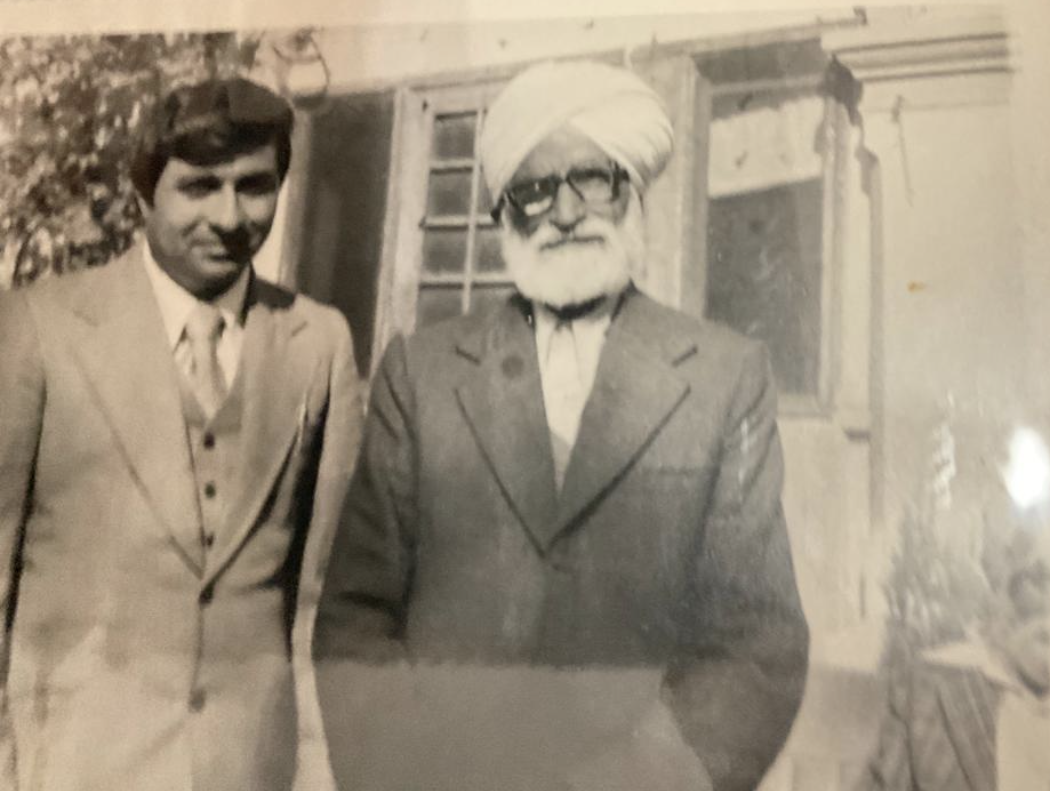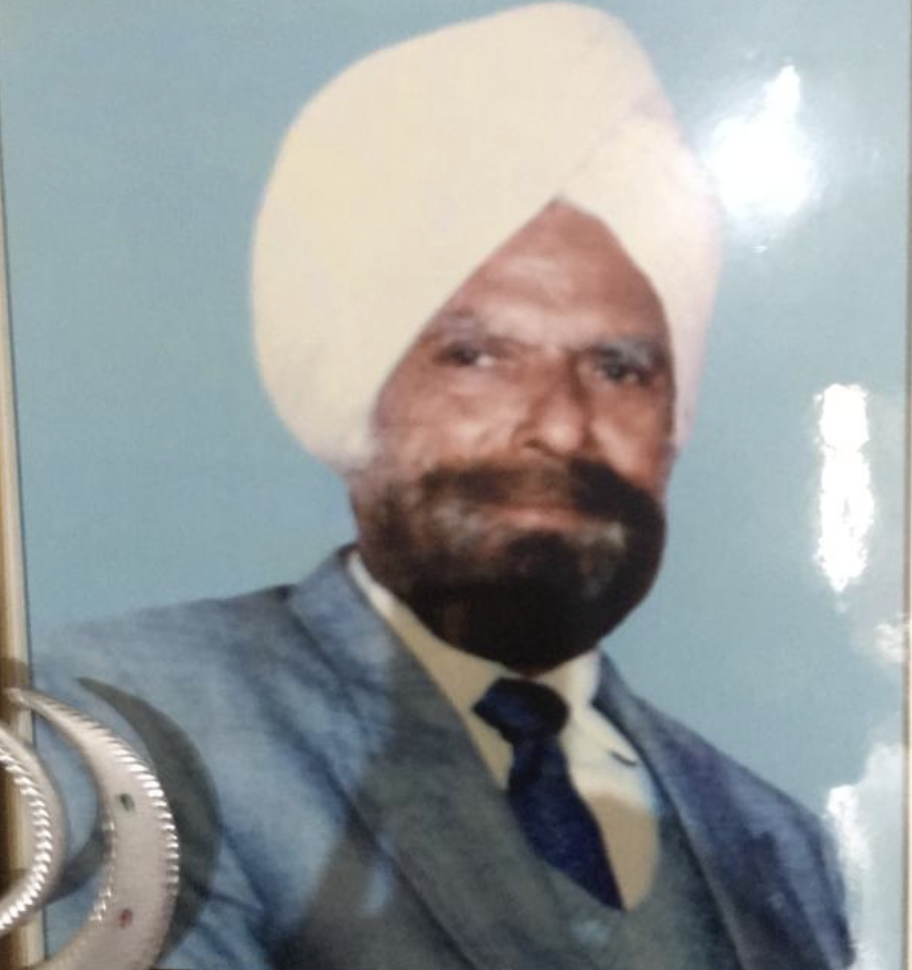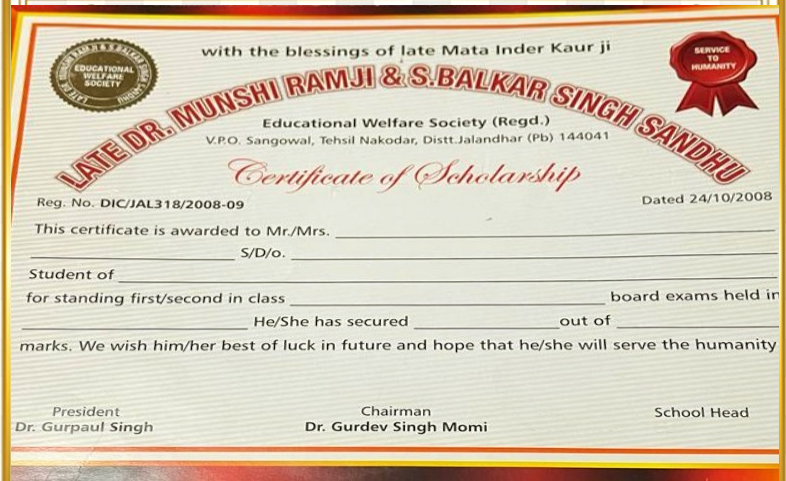Founders

Dr Munshi Ram ji
He was born in the village of Khudian in the district of Faisalabad in Pakistan. His family migrated to India due to the partition in 1947 and settled in the village of Sangowal, district Jalandhar. He studied up to F.Sc. (Faculty of Science), which was considered a good qualification in those days. He acquired a good knowledge of medical treatments and was known as a Hakeem during that time.
He served humanity selflessly by providing treatments using Ayurvedic, Unani, and the English system of medicine known as allopathy, and obtained registration as an RMP (Registered Medical Practitioner). Additionally, he engaged in farming alongside his medical practice. Moreover, he was unanimously elected as the head of the village, known as Sarpanch, for more than twenty years. He was a family man and a proud father of two sons and one daughter.
He also played a praiseworthy role as a matchmaker for many couples. Above all, he played a historic role as a freedom fighter in the independence movement of India from British colonial rule.
On top of all the above-mentioned achievements, he also served as a mentor to many people, including Gurmit Singh.

S. Balkar Singh Sandhu, Headmaster
He was born in 1932 in the village of Sarhali, Tehsil Zarrarwala, District Lyallpur, later named Faisalabad, Punjab, which is now in Pakistan. His father’s name was Bahadar Singh. He studied up to BA, BEd at Doaba College, Jalandhar. His mother passed away at a young age, and his father remarried, so he has three stepbrothers.
He started teaching at GGHG Bet Khalsa High School Mehatpur and was eventually promoted to the position of Headmaster. It was a newly opened school with insufficient students and rooms. Alongside his teaching responsibilities, he and his staff visited nearby villages to recruit students and collect donations for constructing additional rooms. This proved to be a herculean task, as the region, known as Bet, was underdeveloped and economically disadvantaged. Despite the challenges, through determination and working day and night, he succeeded in both collecting funds and increasing student enrollment. After a few years, he transitioned to a teaching position in the government sector
After retirement, he served as a Sarpanch (Head of the village) for ten years and cleaned the dirty, polluted pond in the village.
He also provided financial assistance to Gurmit Singh to help him complete his teaching course and played the role of a model mentor in his life.
In Memory of
Mata Inder Kaur
She is the proud mother of her son Gurmit Singh and four daughters. Gurmit Singh and his two sisters, Dalbir Kaur and Pushpinder Kaur, have been the main contributors to the funds for the scholarships given annually in memory of their elders, who led exceptional and exemplary lives. All the scholarships are given with her blessings.


S. Surain Singh Dhoat Sarpanch
He was born in the village of Lamman Pind in the district of Lyallpur, now in Pakistan. His father passed away when he was very young. His father’s brother, Sher Singh, supported their family until he was grown up and took charge of his family before that.
His family also had to migrate in 1947 due to the partition when British Colonialists left India, and he settled in the village of Rajowal with the extended family. He was married to Parkash Kaur. He had one sister who passed away prematurely after marriage due to illness. He had three sons, two of whom have settled in Canada.
He was elected as the Sarpanch of the village. During his tenure, he was able to get a paved road built to Kot Badal Khan. It was a badly needed relief not only for the people of Rajowal but also for those in adjoining villages. Electricity was also provided to the village during his time as Sarpanch.
His son Baljinder Singh has established a scholarship in his memory at the village school, awarded to the student who tops the eighth-grade class in the annual examination.
Comrade Labh Singh Dhoat
He was born in Laman Pind, district Lyallpur, now in Pakistan. His father’s name was Sher Singh, and his mother was Bhag Kaur. He had one younger brother named Charan Singh and five sisters. He studied up to grade eight and helped his father in farming to support a family of seven kids.
He was an activist in progressive politics, following in the footsteps of his father, who participated in and got arrested in Jaito Morcha to liberate gurudwaras from the stooges of British colonialists. Labh Singh was ahead of his contemporaries in politics during those days, influenced by the Gaddrites and Babar Akalis.
His family was forced to migrate to India in 1947 due to the partition when British colonialists left India. They settled in the village of Rajowal, district Jalandhar. He provided leadership to set up an agricultural cooperative society to help poor farmers access loans, seeds, fertilizer, etc. They also opened a primary school and paid the teacher from their meager income to provide education to the kids of their village and adjoining villages. In three years, they were successful in getting it approved as a government-run school. Labh Singh understood the importance of providing good education to their kids. His eldest son, Avtar Singh, passed matriculation, the middle one, Kulbir Singh, earned a B.A., and the youngest, Jarnail Singh, completed post-graduation.
He went beyond the call of duty to help the families of his sisters and other relatives. Above all, he not only believed in communist ideology but practiced it throughout his life. Due to these beliefs, his life was cut short when he was murdered by unknown culprits at night while he was sleeping in the field to protect their harvested crops.
His son, Principal Jarnail Singh, has set up a scholarship in his memory at Doaba Higher Secondary School in Nurmahal, and another one is at Govt. Middle School in Rajowal, established by his nephew Gurmit Singh, whose family is indebted to him for his assistance beyond the call of duty.

Master Karnail Singh Balli Baghpur
Master Karnail Singh was a close friend of Gurmit Singh, who is the main sponsor of the scholarship given in his friend’s memory. Their relationship began as pen pals during their Basic Teachers Training Course in 1963. Gurmit was at a school in Jagraon, and Karnail was at a school in Lammbrha. Shortly after, they met and formed a strong bond, surpassing all other relationships of flesh and blood.
Gurmit Singh was the only brother in a family of six sisters. His family was financially struggling, and Karnail generously helped him with the marriages of his two sisters. They both planned to enhance their academic qualifications by attending Evening College in Jalandhar. Gurmit secured a teaching job in Jalandhar, and Karnail stayed with him at night after attending college. Soon after, Gurmit obtained a job with the Central Government, offering better prospects, and was posted in Shimla. Unfortunately, Karnail had to drop out due to logistical challenges in commuting daily from his teaching job in a village in Nakodar Tehsil to Jalandhar.
Karnail’s mother, Kartar Kaur, had passed away before their friendship began. After Karnail’s sister, Mohinder Kaur, got married, assistance in managing the household became necessary, as his father, Nand Singh, was engaged in farming. Gurmit’s younger sister, Barjinder, attempted to fill that role. However, it proved unsuccessful as she began missing her biological family. Consequently, Karnail’s father decided to remarry Kulwant Kaur, and Karnail was blessed with three brothers from this union.
In a family feud, Karnail’s father was physically assaulted and injured. Gurmit vividly recalls that Karnail displayed great courage and bravery by confronting the assailants single-handedly, and no one dared to face him.
Karnail got married to Surjit Kaur, and at Gurmit’s invitation, they celebrated their honeymoon in Shimla. Karnail was blessed with two sons, Amman and Navpreet. He was also an activist in the teachers’ union movement and progressive politics.
In 1972, Gurmit migrated to Canada, but they stayed in touch. Unfortunately, Karnail’s life was cut short, and he passed away due to a poisoned drink on February 2, 1990. According to his biodata, he was born on August 15, 1942, in Chak 306, in district Faisalabad, now in Pakistan. His family moved to India in 1947 after partition and settled in the village of Baghpur, district Jalandhar.
Karnail’s family, consisting of three brothers named Pal, Jind, and Bittu, and his two sons, Amman and Navpreet, are prominent adherents of the Rationalist Movement and also activists in the union movement and progressive politics, just like Karnail.
One incident about his bravery that I had forgotten to mention earlier is now remembered. While attending Evening College, some rowdy students in his class were causing disturbances and making fun of the professor. Karnail stood up, positioned himself in front of the class, and challenged the students causing trouble. Nobody had the courage to face him, and afterwards, the class became much smoother, with the professor showing great respect to him.
Gurdev Singh Marok Sangowal
He was born in the village of Sangowal, district Jalandhar. He had four brothers and one sister. He studied up to grade ten and initially secured a job as a bus conductor. Later, he also worked as a clerk at Panjabi University Patiala for three years.
Subsequently, he went to Greece as a migrant worker and found employment in a shipping company. His ship’s route primarily covered European countries, and he assisted many people in migrating there, helping them secure jobs in the shipping industry. After working there for several years, he successfully migrated to Canada. He worked diligently and aided his family in paying off debts. Despite lacking legal status in Canada and working illegally, someone filed a complaint with Immigration, leading to his deportation back to India.
Undeterred, he returned to Greece with his family. He worked on a farm for several years and, once again, obtained visitor visas for the entire family, eventually migrating to the USA. After years of struggle, he finally secured legal status for his family.
He also extended his support to his brother, who was employed with a shipping company in Greece, helping him migrate to America, along with assisting numerous others. A devoted follower of Dera Radha Soami Beas, he went above and beyond the call of duty to help construct a building for the Dera in North Carolina, USA.
Unfortunately, his life was tragically cut short due to an incurable mental illness, and his end was painful. In his memory, his family has established a scholarship at a private school in the village of Sangowal. He is deeply missed by his near and dear ones


